- Home
- Nick Carter
Cambodia Page 3
Cambodia Read online
Page 3
Ben-Quang rocked to his feet and stood. His eyes never left the jungle. He brushed the back of his pants as I moved to my feet beside him. I let my eyes follow where he had been staring. There was a figure coming out of the jungle toward the village.
"How many?" I asked.
Without looking at me, Ben-Quang said, "I know nothing more of the Society. Put your questions to Nam Kien. He will know. The Society murdered his son." He lifted his gnarled hand and pointed at the distant figure. "Here he comes now," he said.
The man approaching looked short and stocky. His steps were sure and quick. I figured he was a young man although he was still too far away to see his face. I glanced at Ben-Quang.
The old man seemed to be waiting with anticipation, as though the approaching figure was an old friend. He was a strange one, I thought, but not really. An American tourist hearing the words Ben-Quang had told me probably would have exploded with indignation. I had been to almost every country in the world. My own beliefs were nobody's business but my own. I was an agent for my country. If I were captured, my country would deny my very existence. I accepted this as part of the paycheck. But I knew there were always many sides to every situation.
In my opinion my country was not always right. Her history was frequently marked with stupid mistakes. But even the words right and wrong were relative. There could be no fine line of distinction. So I had listened to the words of Ben-Quang in silence. I had heard them before. Each ideology, each country, was looking for its own personal place in the sun. Each thought its way was the right way.
My own beliefs were more basic and more personal. They involved only two things — life and death. For me death was always the next step or around the next corner. Life was something I could hold on to for short periods. I could not waste time simply taking up space. I had to grab what I could, enjoy it fully and let it go when I moved on. Each assignment for me was individual. It had little to do with countries, ideologies or war. Each was a simple or complicated problem that I alone had to solve. I knew I was simply a tool, but I intended to be one of the best tools on the bench, if for no other reason than just to stay alive. So Ben-Quang had his thing and I had mine.
Nam Kien greeted Ben-Quang by wrapping his arms around the old man. They smiled at each other and spoke quietly in Vietnamese. Nam Kien was not young. His straight hair was salt and pepper. He didn't seem to have a neck, it was as though his head sat between his huge shoulders. He was much smaller than I was, but I doubted if he weighed much less. He was built like a bull, with thick powerful-looking arms. His face was wrinkled but not gnarled like Ben-Quang's. His voice was deep. I stood silently as the two men talked. Eventually they got around to me.
Nam Kien turned away from his friend to face me. He had a brooding look. "So you are the American, Nick Carter." It was not a question, just a statement to let me know I had been noticed. "And you are going to pass yourself off as a native."
"I am going to try," I said through tight lips. "Will you take me to Angkor Thorn or won't you?"
"Yes, I will take you."
"When?"
He looked up at the sky, shielding his eyes with his hand. Then he looked back at me. The brooding look was a permanent part of his face. "With your size you cannot travel by daylight. When the sun is down we will leave."
Ben-Quang said, "He has been asking about the Society of the Silver Snake."
Nam Kien's whole facial expression changed. His jaw muscles tightened, his body went rigid. He stared at my face with open contempt. "If you are a friend of the Society," he said slowly, "I will kill you where you stand."
I let my lips move to a small smile. "Then it would be foolish for me to tell you I am a friend of the Society."
He remained rigid. Ben-Quang put an arm on his shoulder. "He did not know the Society existed until I told him," the old man said.
Nam Kien relaxed slightly. He still looked at me but some of the contempt had gone from his face.
I said, "Can you tell me anything about this Society?"
"They are butchers and murderers. I will tell you nothing else." He then walked away with Ben-Quang beside him.
I watched until they had entered a hut. Then I sat and lit a cigarette. The children continued to play around the huts. The old women had returned to the pot over the open campfire. The men of the village continued working in their gardens.
Four
The heat did not lessen with sunset. Ben-Quang and Nam Kien had spent most of the day in their hut. I milled around watching the daily activity of the village. The people seemed puzzled by me, but their curiosity was not enough for them to ask questions. They let me watch what they were doing, but they didn't speak to me.
During the day only elderly men, women and very young children were left in the village. The others were working in the four rice paddies stretching to the south. At sunset the women began drifting in from the paddies. Mostly they were small and wiry, and although their bodies looked youthfully firm from the work, their faces showed age before their time. As they drifted in they took charge of the children and began doing housework. Laundry was taken to the stream that bubbled west of the village. The men would return from the paddies soon and there was much to do.
At sunset I walked between the thatch-roofed huts watching the activities with a curious fascination.
Also at sunset Nam Kien emerged from a hut, his pack already on his back. I was standing across from the hut listening to the jungle sounds. It had almost become too dark to see. Nam Kien walked across the short open space toward me.
"We go now," he said.
I nodded and stomped out a cigarette. Nam Kien's eyes looked heavy from sleep. I crossed to the hut and grabbed my pack. He waited impatiently while I shrugged into it. Then I nodded to him and without a word he started off. I followed slowly. There was no sign of Ben-Quang.
Although Nam Kien's stocky legs were short, he pumped them up and down often. I found myself taking long strides to keep up. He never looked back to see if I was there and he never spoke. My shirt was soaked with sweat by the time we reached the jungle.
The jungle birds kicked up a hell of a racket as we plunged in. There had been just enough light to make out Nam Kien's back, but once the thickness of leaves closed around us the darkness became total. Nam Kien moved along a well-Worn path. I didn't know if he was going to try to play games with me like Ben-Quang, but just to be sure I kept myself right on his tail.
After an hour I felt as though I was moving rapidly down a narrow hallway. The path was uneven and curved. But the jungle raised black walls on each side.
Nam Kien kept moving quickly and silently. When an hour and a half had passed, I started getting angry. I had a pretty good idea what Nam Kien was trying to prove. He was waiting for me to tire, to tell him to slow or stop and rest. Maybe he thought all Americans were soft button-pushers. I didn't know what he thought, and at that point I didn't much give a damn. I didn't expect a lot of small talk and friendly smiles, but I didn't expect silent hostility either. I didn't need this; I didn't need any of it.
"Hold it, Nam Kien!" I said loudly. I stopped in my tracks and started easing the pack off my shoulders.
He took seven steps more before he stopped. Then he turned slowly. It was too dark to see the expression on his face. He started walking back to me. "You are tired?" he asked. "You wish to rest."
I crouched down on one knee. "I wish to talk," I said. I lit a cigarette.
Nam Kien eased off his own pack and knelt beside me. "Americans are always talking," he said sarcastically.
I let it pass. I knew how he felt, but I didn't know why and didn't care. I looked at the dark shadow of his face. "Nam Kien, I think you and I should understand each other beginning right now. I'm not asking that you like me; I really don't give a damn if you do. But if you want to run a foot race to Angkor Thom, then take off. I want a guide not an Olympic athlete. If I offend you for some reason, just let me know and I'll get another guide. I don't
need you trying to wear me down. I don't need your hostile silence. I don't need your sarcastic remarks." I let that set with him for a few seconds.
He was crouched straight across from me looking down at the path while I talked. Sweat was dripping from both of us. The jungle birds were still making their racket. If Nam Kien was listening he made no sign.
Finally he sighed and said, "There is a village not far from here. We will rest there and eat."
I nodded. "Okay. What do you know about this Silver Snake Society?"
Nam Kien stood suddenly. "I will guide you," he said with a strained voice. "But I will not speak of the Society." He picked up his pack and started pushing his arms through the straps. "We will move slower if that is your wish."
He started off. I pulled my own pack on and started after him.
Although Nam Kien continued on in silence, he did slow his pace. The path became thin in places, and we had to push through thick growth. After another hour of my following him, he struck off to the right through the thick jungle. I plowed after him, keeping up with him more by sound than by sight. The darkness was total. I couldn't even see the vines I was crashing through. The jungle thinned and there seemed to be many paths crisscrossing with the one we were on. When the path widened enough, I moved alongside Nam Kien.
The village seemed to spring up in front of us. I saw the thatched roofs first, looking almost silver in the moonlight. The jungle just seemed to pass away on each side of us, and we stepped into a clearing. Like the first village, this one had the huts arranged in a circle.
I turned to my left and saw two young men with old bolt-action rifles across their shoulders. They stepped out of the jungle about 50 yards from me and walked easily apace with me. Two more men stepped out of the jungle about the same distance to my right.
I shot a glance at Nam Kien. He walked unconcerned, and I thought I saw the corners of his mouth turned up in a wry smile.
A man stepped out of the nearest hut with two wooden bowls in his hands. As we approached him, he handed Nam Kien and me bowls filled with rice. Nam Kien let the pack drop from his shoulders and squatted on his haunches. The other man, who looked to be about Nam Kien's age, squatted opposite him. They spoke in Vietnamese while Nam Kien dipped fingers of rice from the bowl to his mouth.
I eased my pack down and squatted a small distance from the two men. I started eating the rice. Although it was late, there seemed to be a lot of activity around the village. There was a lamp burning in almost every hut. As I ate I watched the four men who had stepped out of the jungle. They walked with an insolent prance, keeping their eyes on me. They had probably gotten the rifle across their shoulders idea from an old John Wayne movie. They were teenagers, looked about 18 or 19. I kept watching them until they went into one of the huts.
The man talking with Nam Kien suddenly stood. Nam Kien remained squatted. He listened while the standing man said something in a snappy biting tone, then the man turned on his heels and walked away.
I shuffled over to Nam Kien. "What was that all about?" I asked.
"Chief," he said nodding to the retreating man. "He does not want us here. He wants us to return."
"What the hell for?"
"He say you are too large to be a villager. He say North Vietnamese know you are some kind of agent."
I frowned. "That's stupid. How could they know?"
"He say they know you are an American. He say they think you are a spy."
I shoved more rice in my mouth. I didn't know what to think. Sure — if the North Vietnamese had seen me, they might think I was a spy. But when had they seen me? Were they following us?
"What difference does it make to this chief what I am?" I asked. "What does he care what the North Vietnamese think?"
Without looking at me, Nam Kien said, "Could be village is in danger. Could be other villages are in danger." He looked over at me as he reached for his pack.
When I was standing and pushing my arms through my pack straps, I said, "What about those four who came out of the jungle with us? Maybe they tipped us off to the North Vietnamese."
Nam Kien was squinting toward the hut the four men had entered. He looked at me with no expression in his eyes. "I think we should leave now," he said.
I nodded. We started off at a quick pace. When we reached the edge of the jungle, I turned back. The four young men were coming out of the hut. One of them pointed at me. Two others joined them and looked where he was pointing. All six of them had those old bolt-action rifles. They started to run from the hut toward us.
"They're coming after us, Nam Kien," I said.
Nam Kien was looking over his shoulder at the six men. "They are young," he said without feeling. "They will be easy to lose."
In a matter of minutes we had once again been swallowed by the blackness of the jungle. The caws and screams of the birds told us we were unwelcome.
By the time our young pursuers entered the jungle, we had moved almost half a mile. The jungle cries behind us gave us a pretty good idea where the six were. I kept right on Nam Kien's tail, and I think it surprised him. I figured the hostility he'd shown toward me was because he had me pegged as some kind of dud. I may not have known the right trail to take through the jungle, but I was no stranger to this kind of travel.
Nam Kien left the main trail and started crashing through the thick branches. I knew if we could hear our pursuers, they could undoubtedly hear us. If Nam Kien was any kind of night fighter, he'd realize there was a time to run, a time to stand and fight and a time to hide and watch. My respect for him leaped when he led us to a tiny four-foot circular clearing well off the main trail then suddenly held up his hand. We froze. We crouched, both panting slightly. I could feel the sweat dripping from me. Nam Kien's face was expressionless.
We waited crouched and motionless and finally heard the thrashing. The men had stepped off the main trail but on the opposite side from where we had. It was easier going on that side. And maybe they figured that a couple of old timers like Nam Kien and me would be taking the easier route.
They were moving slowly now. I looked at Nam Kien. Our eyes locked. Each of us knew what the other was thinking. With two more good men, we could have taken all six of them easily.
The thrashing kept fading past us. When it was almost too quiet to hear, Nam Kien's muscles seemed to relax. He shrugged out of the back pack and stretched out. I dropped my pack behind me and leaned back on it. I pulled out one of my cigarettes and handed one to him. When we were both lit and smoking, I said, "If they were North Vietnamese, why didn't they try to take us right there in the village?"
"Face," Nam Kien said. "They would have lost face with the villagers. We were only two while they were six.
I gave Nam Kien a crooked smile. "I'm not so sure it would have been easy to kill us."
"Neither am I," he said.
He put out his cigarette and lifted his pack.
I pulled on my own pack and stood facing him. "These terror tactics sound a little like the Society of the Silver Snake," I said.
He turned his back to me. "We will not have to travel so swiftly now," he said, moving back into the jungle.
When we got to the main trail, I stayed behind him as we moved along. I finally had to accept it: I was going to learn nothing about the Society from Nam Kien. My best bet would be to ask around as we moved from village to village. Surely somebody besides Nam Kien had heard of the Society. Of course I could have been put on by Ben-Quang and Nam Kien. It could be the Society didn't exist at all. Maybe all this hokum about butchers and murdered sons was just a big con game at my expense.
Creatures of the jungle continued to complain as we moved through their territory. As we traveled I had even greater respect for Nam Kien as a guide. He knew the jungle as a worker knows the way to his job day after day. The hours passed, and I found myself wondering about him — what kind of family he had, how he met Ben-Quang and what they meant to each other, where he really lived, how he happened to get th
is job of guiding me. They were questions that might never be answered. Nam Kien was not the mouthy type.
I figured it was about two hours before dawn when once again the jungle began to thin. The trail became wide and well worn. Other paths crossed it. We were coming close to another village. I moved to walk beside Nam Kien. He seemed to look worried about something. Then I felt worried, too.
Nam Kien silently pushed his hands out from his sides. He didn't have to do it twice; I knew what he meant. While he veered to the left, I moved away from him to the right. If we were walking into something, we shouldn't go in like a couple of drunks arm in arm.
It was puzzling, like a dream you've had and you're trying to remember it and you can't. The feeling was there, and it was real, yet I couldn't put my finger on what caused it. If we were walking into a trap, we'd be ready for it. Nam Kien and I were about 20 yards apart. We weren't in the open. Both Wilhelmina and Hugo were close at hand.
But the danger was not for us. The danger had already passed. Nam Kien and I walked into the village wary and under cover. We stayed that way even when we discovered the first dead child with his head cut off. And we still darted from hut to hut after we passed the bodies of two disemboweled men and four mutilated women. We were looking for an enemy, and we continued to look until the sky began to lighten with dawn. Then we had to accept it. The enemy was gone. Every man, woman and child had been killed. The village was wiped out.
Five
There's no way you can prepare yourself for something like that. You tell yourself you're an agent, you're hardened against the sight of death. You've seen the flies and worms crawling out of sightless eyes. You've seen women used horribly in torture. It's always unpleasant, but there isn't anything really new about it. You've seen it all before. But not like this.
We searched every hut, the grounds all around the village. Although we didn't say it to each other, we knew. We were looking for six teenage boys. If we located them, we would kill them without question. And we would find pleasure in the killing.

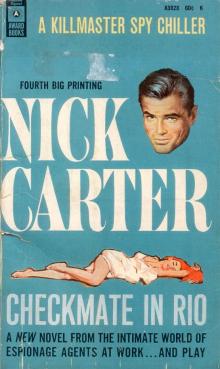 Checkmate in Rio
Checkmate in Rio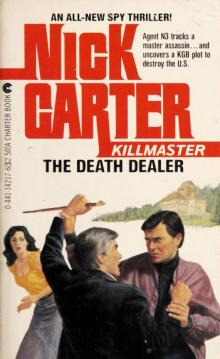 The Death Dealer
The Death Dealer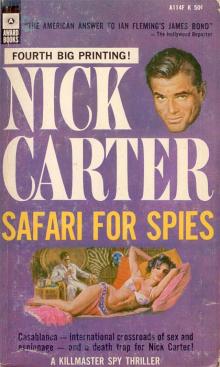 Safari for Spies
Safari for Spies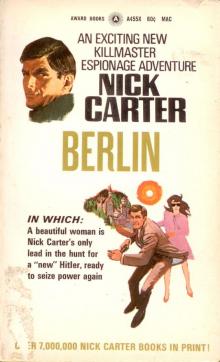 Berlin
Berlin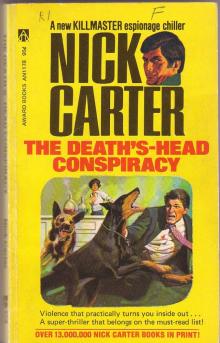 The Death’s Head Conspiracy
The Death’s Head Conspiracy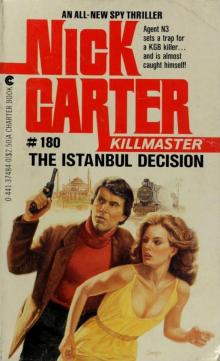 The Istanbul Decision
The Istanbul Decision The Liquidator
The Liquidator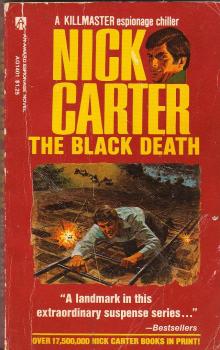 The Black Death
The Black Death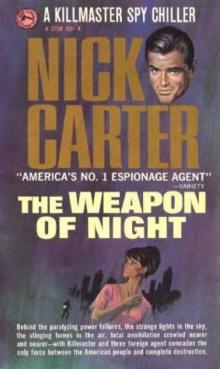 The Weapon of Night
The Weapon of Night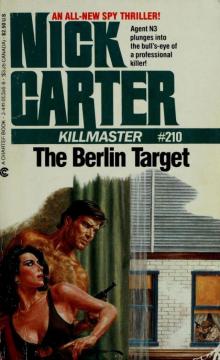 The Berlin Target
The Berlin Target Temple of Fear
Temple of Fear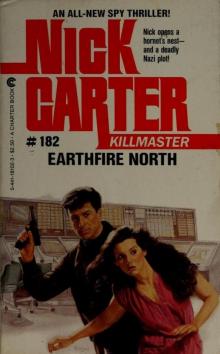 Earthfire North
Earthfire North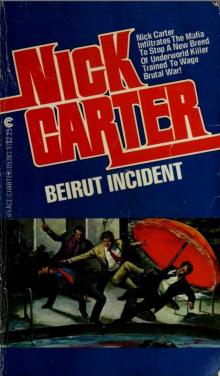 Beirut Incident
Beirut Incident White Death
White Death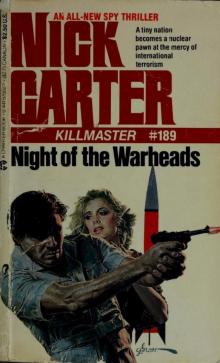 Night of the Warheads
Night of the Warheads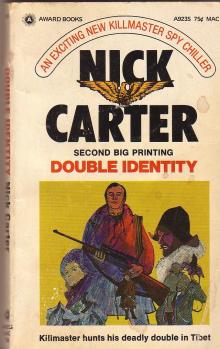 Double Identity
Double Identity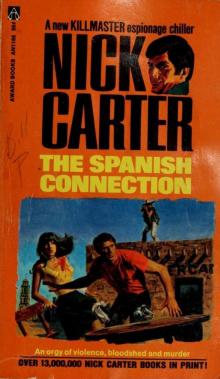 The Spanish Connection
The Spanish Connection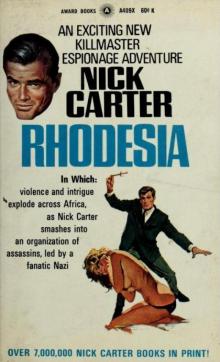 Rhodesia
Rhodesia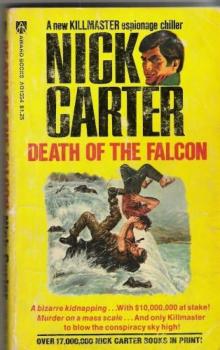 Death of the Falcon
Death of the Falcon The Executioners
The Executioners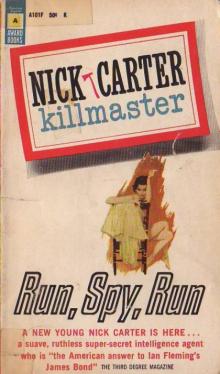 Run, Spy, Run
Run, Spy, Run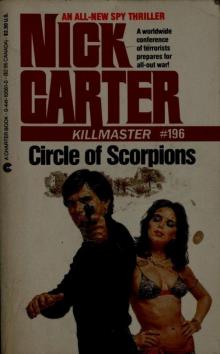 Circle of Scorpions
Circle of Scorpions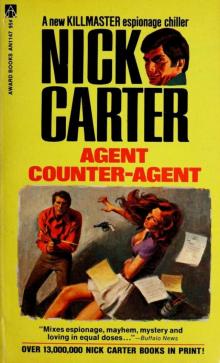 Agent Counter-Agent
Agent Counter-Agent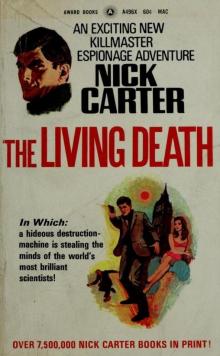 The Living Death
The Living Death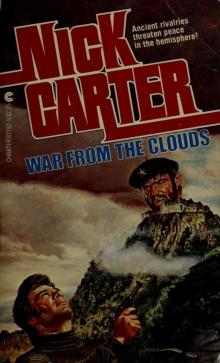 War From The Clouds
War From The Clouds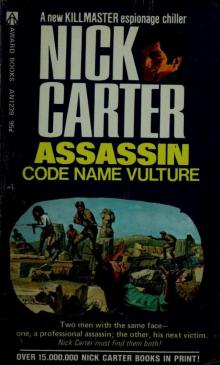 Assassin: Code Name Vulture
Assassin: Code Name Vulture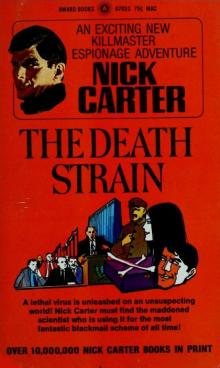 The Death Strain
The Death Strain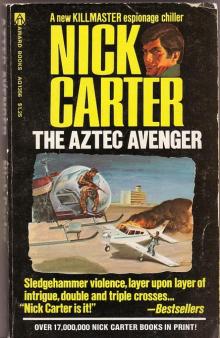 The Aztec Avenger
The Aztec Avenger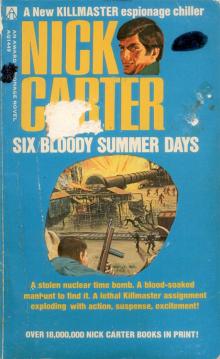 Six Bloody Summer Days
Six Bloody Summer Days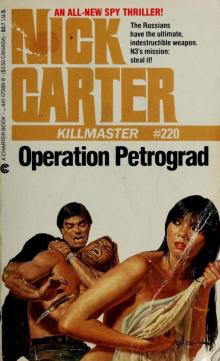 Operation Petrograd
Operation Petrograd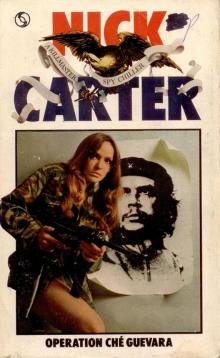 Operation Che Guevara
Operation Che Guevara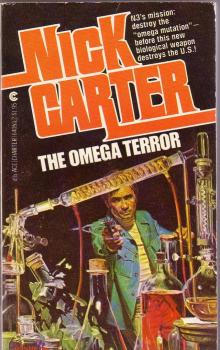 The Omega Terror
The Omega Terror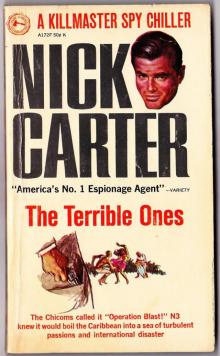 The Terrible Ones
The Terrible Ones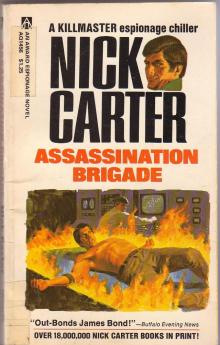 Assassination Brigade
Assassination Brigade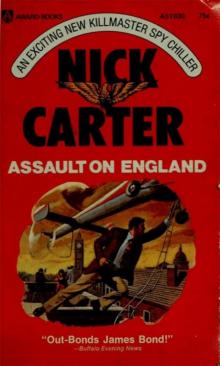 Assault on England
Assault on England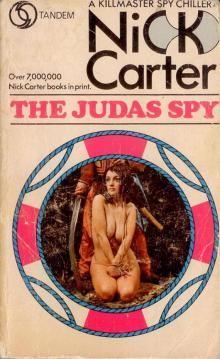 The Judas Spy
The Judas Spy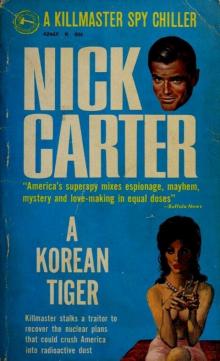 A Korean Tiger
A Korean Tiger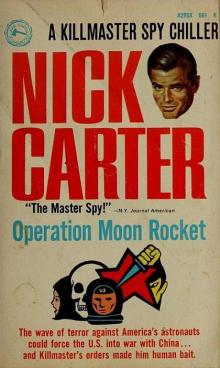 Operation Moon Rocket
Operation Moon Rocket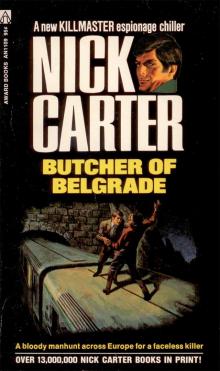 Butcher of Belgrade
Butcher of Belgrade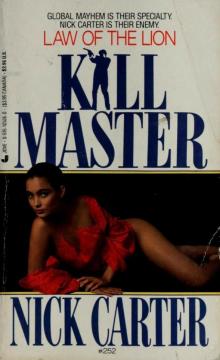 Law of the Lion
Law of the Lion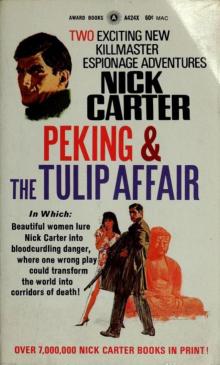 Peking & The Tulip Affair
Peking & The Tulip Affair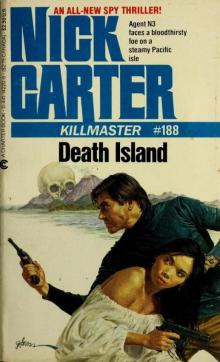 Death Island
Death Island The Jerusalem File
The Jerusalem File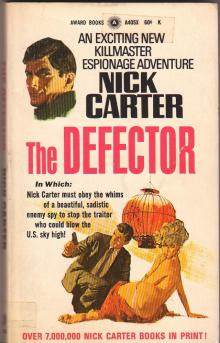 The Defector
The Defector The Fanatics of Al Asad
The Fanatics of Al Asad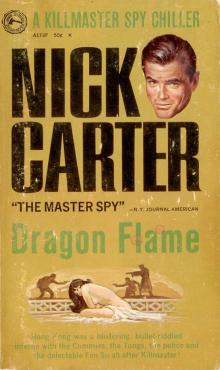 Dragon Flame
Dragon Flame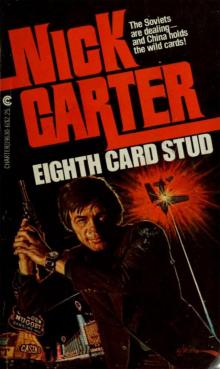 Eighth Card Stud
Eighth Card Stud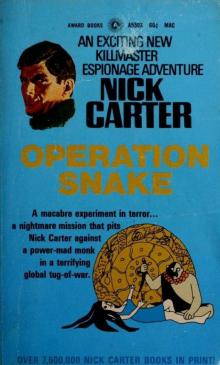 Operation Snake
Operation Snake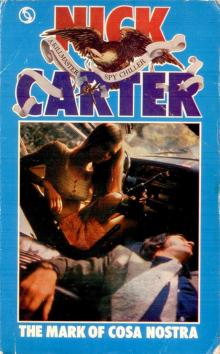 The Mark of Cosa Nostra
The Mark of Cosa Nostra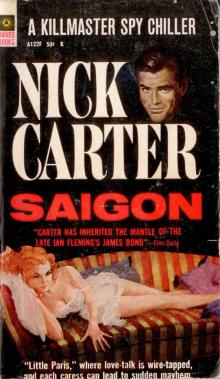 Saigon
Saigon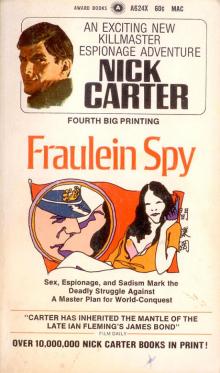 Fraulein Spy
Fraulein Spy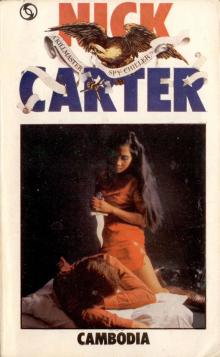 Cambodia
Cambodia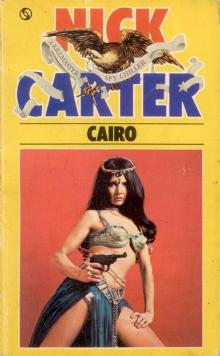 Cairo
Cairo